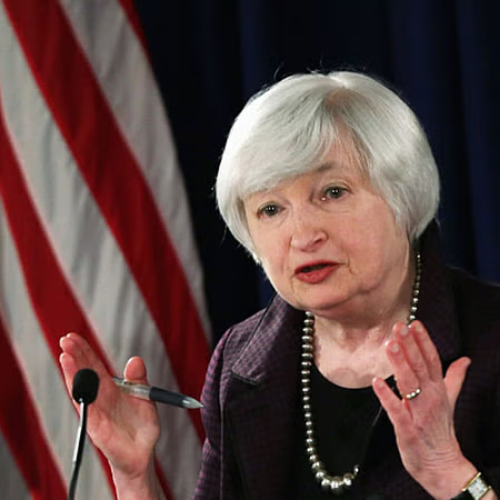The U.S. Treasury, led by Secretary Janet Yellen, is exploring more ways to limit Russia’s oil income, which helps fund its war efforts in Ukraine. One major target is the so-called “dark fleet” of oil tankers—ships that operate secretly to transport Russian oil above the price cap of $60 per barrel. This price cap, established by the U.S. and its allies, restricts Western insurance and shipping services for oil cargoes sold above this price.
Yellen explained that while sanctions have already been applied to some tankers and their owners, more measures could be introduced before she leaves office in five weeks. She emphasized that any step to cut Russia’s oil revenues would benefit Ukraine. The U.S. government is also considering lowering the $60 price cap further, taking advantage of the current drop in global oil prices. On Friday, Brent crude oil traded at $74.50 per barrel, much lower than the $85.57 price when the cap was first enforced in December 2022.
Yellen’s remarks come as the Biden administration works urgently to strengthen support for Ukraine before a new president takes office. Efforts to cripple Russia’s economy have intensified, especially as Russia shifts to war-focused production, blurring the line between civilian and military industries.
Pressure Mounts on Chinese Banks Over Russia Links
Yellen highlighted that U.S. officials are keeping a close watch on financial institutions, especially Chinese banks, that might be helping Russia conduct transactions related to its war. Although the U.S. has not yet imposed direct sanctions on Chinese banks, Yellen said she would not rule out this possibility. For such sanctions to happen, the U.S. needs strong evidence that a bank is directly supporting Russia’s war-related activities.
Yellen noted that U.S.-China economic talks over the past two years have helped to warn Chinese banks about the risks of dealing with Russia. Many of the larger banks in China have become cautious, as U.S. sanctions could cut them off from critical dollar-based transactions, which are essential for international trade. Yellen pointed out that China recognizes the seriousness of such actions and wants to avoid having its banks face these severe penalties.
The Hidden Fleet: Ukrainian Intel Unmasks Russia’s Oil Smuggling Operation
At the same time, the Biden administration has been using an executive order to sanction any financial institutions that support Russia’s war. This authority has been helpful in deterring smaller financial entities from taking risky actions. However, as Russia’s economy shifts further toward military production, it is becoming increasingly challenging to separate commercial transactions from war-related ones.
Ongoing U.S.-China Talks: Sanctions Not the Main Focus
The final meeting of the U.S.-China Financial Working Group is set to take place next week in Tianjin, China. While the focus will primarily be on global financial stability and crisis management exercises, Yellen stated that sanctions would not be a major discussion point during this meeting. Instead, the talks aim to keep communication channels open between the two countries, which helps prevent misunderstandings and resolve financial concerns more effectively.
Yellen stressed the importance of maintaining regular dialogue between U.S. and Chinese officials, rather than relying only on meetings between national leaders. She also highlighted that despite these conversations, China has not altered its state-controlled economic approach. For instance, Yellen commented on recent U.S. tariffs on Chinese electric vehicles, which are tied to China’s trade practices.
In addition to sanctions, concerns about China’s currency practices have surfaced. A recent report indicated that Beijing might consider devaluing its yuan to counteract U.S. tariffs. However, Yellen clarified that China has typically been increasing its currency’s value rather than lowering it. She mentioned that the Treasury has tools to respond strongly if currency manipulation occurs.


